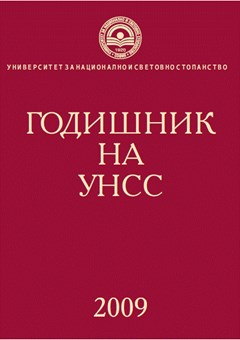Взаимовръзката между икономически растеж – финансово развитие (Иконометричен анализ за България: 1991-2006 г.)
Author: Стати Статев
Interrelationship between Economic Growth and Financial Development (Econometric Analysis for Bulgaria: 1991-2006)
Stati Statev
Abstract
Настоящата студия представлява иконометрично изследване на взаимовръзката между икономическия растеж и развитието на банковата система в България чрез прилагане на методи за анализ на динамични редове. В него се прави проверка за наличие на краткосрочна и дългосрочна причинност между динамиките на двата сектора, оценява се на присъствието на дългосрочна зависимост между тях и се идентифицира конкретната посока на въздействие. Характеризира се ролята на инвестициите като един от фундаменталните трансмисионни механизми и се извеждат прогнози относно видът и динамиката на интерпретираната взаимовръзка в бъдещ период. Иконометричните резултати показват, че в български условия релацията “финансово развитие - икономически растеж” е изключително сложна, в повечето случаи двупосочна, нерядко противоречива, и с ясно изразени специфики при различните парични режими. Превес имат дългосрочните зависимости и причинни въздействия между двата сектора, като доминиращата посока на влияние през втория период е от реалния към финансовия сектор. След средата на 1997 г. инвестициите се проявяват като значим канал за пренасяне на ефекти от финансовата система към реалния сектор, което не е типично за предходния времеви интервал. Прогнозите за бъдещ период показват доминиращ и увеличаващ се принос на икономическия растеж при неговото регресиране по финансовото развитие, докато при тестването на хипотезата, че финансовото развитие се причинява от растежа, доминиращ и намаляващ във времето принос имат финансовите променливи.
Abstract
This research paper makes an econometric study of the interrelationship between economic growth and the development of the banking system in Bulgaria by applying the method of dynamic series analysis. The study verifies the presence of a short-term and long-term causality between the dynamic development of the real and the banking sectors, assesses the presence of a long-term dependency between them, and identifies the specific direction of the impact exerted by such dependency. The study characterizes the role of investments as one of the fundamental transmission mechanisms and maps out forecasts about the type and dynamic development of the interconnection, subject to the study, in a given future period of time. The econometric results indicate that in the conditions existing in Bulgaria, the relation between financial development and economic growth is extremely complicated: in most cases it is two-way, frequently it is contradictory, and manifests clearly expressed specificities under the different monetary regimes. What gains the upper hand, however, are the long-term dependencies and causal effects in the relationships between the two sectors, whereby the dominating direction of the impact during the second period subject to the study is from the real to the financial sector. After the middle of 1997, investments turn out be a significant channel for transmitting effects from the financial system to the real sector of the economy, which is quite non-typical for the preceding period of time. The forecasts for a future period of time indicate the dominating and increasing contribution of economic growth when it is generated by financial development. When we test the hypothesis that financial development is caused by economic growth, however, it is financial variables that have a dominating and declining contribution with time.

